The Retail Disruption Opportunity
Mass store closures, soaring online sales and changing shopper expectations testify to the rapidly shifting nature of retail. In the last year, shoppers have continued to turn to new retailers, brands, marketplaces and channels, while retailers have looked for further collaboration opportunities to future-proof their offerings. E-commerce and technology are advancing—and consumer behaviors and preferences are changing—faster than ever before.
Advances in technologies such as artificial intelligence (AI), 3D image rendering, visual search and QR codes have enabled innovative startups to spring up and fill the gaps between what’s imaginable and what’s possible. In doing so, they’re creating significant opportunities for retailers and brands to boost sales, improve digital merchandising, enhance the retail experience and connect more deeply with customers.
Coresight Research’s Innovator Intelligence Platform: Connecting the Retail Value Chain with the Most Promising Innovators
Coresight Research recently launched the Innovator Intelligence platform to connect today’s most promising and innovative startup entrepreneurs with Coresight’s network of top-tier retailers and brands and private equity, venture capital and technology firms. The platform builds collaborative communities and ensures future-focused thinking by highlighting some of the most promising new companies around the globe that are fueling innovation across the retail value chain.
Innovator Intelligence enables this interaction via services that include cobranded research reports, road shows, speaking and networking opportunities at events and webinars, and Innovator Intelligence reports. These services offer innovative companies the opportunity to generate leads, increase brand and investor community awareness, and validate (with either potential investors or target clients) and scale their products and experiences.
Additionally, Coresight Labs, which will soon launch on our website, provides a curated startup database of more than 5,000 companies focused on retail and technology. The Coresight Labs portal will also include retail-tech landscape maps that highlight innovations across the globe. For business leaders looking for acquisition, investment or partnership opportunities, and for those just monitoring industry advancements, Coresight Labs will be an invaluable source of innovation intelligence.
In this report, we highlight 10 companies that that we think are poised to disrupt and drive the future of retail. Some have already leveraged the Innovator Intelligence platform to successfully grow their business. The companies featured range from early-stage firms to companies that have already inked major deals and gained national exposure. These companies’ various solutions are revolutionizing the retail industry in one of three ways:
- Creating new retail experiences.
- Helping brands and retailers collect actionable business intelligence or providing them with personalized marketing tools.
- Optimizing business functions in terms of inventory management, excess inventory, quality inspection or supply chain logistics.
Snapshot of Companies
Caraa is a New York City–based sports bag and accessory company cofounded by Aaron Luo and CFDA-award-winning designer Carmen Chen Wu. The continuing normalization of athleisure has created high demand for clothing and accessories that are as functional as they are stylish, and Caraa has developed handbags and accessories products that combine high fashion with performance features.
Celect provides a cloud-based merchandise-optimization platform that helps retailers optimize their overall inventory portfolios in stores and across their supply chains. Celect transforms the intuition-based merchandise-planning process into a data-driven process with machine learning and predictive analytics.
Inspectorio is a technology firm offering a cloud-based web and mobile software-as-a-service (SaaS) platform that allows retailers, brands, vendors and factories to digitalize their quality control and compliance-monitoring processes. The apparel and footwear industry is still largely served by a fragmented supply chain, and manufacturers, suppliers and retailers often work in silos with little coordination. This makes quality control and compliance monitoring very difficult for brands and retailers. The Inspectorio platform uses AI, the Internet of Things (IoT) and mobile technology to improve supply chain efficiency, visibility and productivity.
Radius8 created a retail software platform that empowers retailers to dynamically merchandise online by using data on their physical stores and local market intelligence to provide contextual discovery for shoppers. The Radius8 localization cloud collects data on local browsing behaviors, weather, store inventories, events, geolocation, time of day, social trends and in-store sales trends, then leverages analytics on these data to help retailers offer relevant and engaging experiences across physical and digital channels.
Inturn is a global off-price B2B exchange that is reinventing the way brands and retailers sell and buy excess inventory in order to improve profitability, decision making and cash flow for both sides. The platform seeks to replace the time-consuming and error-prone liquidity process that the off-price industry has historically relied on. It reduces manual work processes, expands accessible and content-rich product information, and integrates analytics into the brand-retailer negotiation process.
Markable utilizes AI software, primarily in the form of computer vision, to analyze and organize images and products. The software provides retailers and brands with the tools they need to utilize visual search, present visually similar product recommendations and lookbooks, style products, and implement Markable’s AI-based attribute auto-tagging technology. Markable enables users to upload a photo from their camera or an image they have downloaded that features a specific product, and then locate that product for sale online.
Price Technologies (Price) aims to provide consumers with the most efficient product-matching service on the internet. The company’s vision is to maximize savings for consumers and, at the same time, benefit e-commerce businesses by providing them with a seamless checkout experience.
Price’s e-commerce application Price.com will bridge the present gaps between online marketplaces by providing complete price transparency for shoppers. The company’s product matching technology leverages data on more than 150 million products collected from more than 2,000 retail partners and online marketplaces.
Spring Marketplace (Spring) operates at the intersection of retail, payments and digital marketing, helping companies gain insights into their customers’ purchase behavior and target their engagement strategies accordingly. Spring’s cloud-based marketing platform functions as an extension of retailers’ existing customer relationship management solutions. Through partnerships with payment networks (Visa, Mastercard and American Express), Spring provides clients a complete view of their customers’ spending behavior both in-store and online. The platform also connects consumers’ payment cards to customized loyalty programs, enabling retailers to track how their digital marketing affects in-store transactions and tailor their future efforts accordingly.
Trivver provides an exchange platform for extended reality (XR) advertisements, including 3D, augmented reality (AR), virtual reality (VR) and mixed reality (MR) ads. Advertisers and brands can create a single 3D object to implement across all XR platforms. Trivver claims to benefit users, publishers, advertisers and brands by eliminating both disruptive banner and preroll video ads and the need to manually insert branded objects into various ad environments.
True Fit is a data-driven personalization platform for footwear and apparel retailers. Its Genome platform collects manufacturing design data from leading apparel and footwear brands, anonymized consumer order data from top retailers, and personal preference data from its registered users. True Fit then maps the style, fit and technical attributes from clothes and shoes to the detailed preferences of individual shoppers, providing consumers with a personalized experience that includes style rankings, fit ratings, size recommendations and fit details.
 Caraa
Caraa
Company Description
Caraa is a New York City-based sports bag and accessory company cofounded in 2015 by Aaron Luo and CFDA-award-winning designer Carmen Chen Wu. The company’s handbags and accessories products combine high fashion with performance features. The founding ethos, according to Luo, is to create well-made, versatile and smart sports bags that can transition from street to fitness studio and from business meeting to dinner. The result is a set of hybrid accessories that marry beauty and function, while balancing quality and sports functionality.
In the three years since Caraa launched its convertible Studio Bag, the company has been covered by Vogue, Women’s Wear Daily, Shape, Women’s Health, Esquire, Business Insider, Refinery29 and other media outlets. The company received the 2017 Digiday award for Most Innovative Brand. Caraa is currently stocked by Nordstrom and Equinox, and the Caraa x Athleta collection is stocked exclusively through Athleta.
 Caraa’s Studio Bag collection
Source: Caraasport.com
Caraa’s Studio Bag collection
Source: Caraasport.com
Market Overview/Addressable Market
The continuing normalization of athleisure has created high demand for clothing and accessories that are as functional as they are stylish. We estimate that the US sportswear market will grow by 7% year over year this year, to almost $116 billion. Within this sizable industry, both traditional sports apparel companies such as Nike and fashion companies such as Tory Burch have forayed into the athleisure handbag category. Yet there remains a need in the market for a product that combines fitness DNA with high fashion appeal at an accessible price point.
What Problem Is the Company Solving?
Many modern consumers—particularly millennials, who comprise the largest demographic in the US—lead inherently active lifestyles, and they are demanding functional products that are purposefully designed to withstand activity. According to Marshal Cohen, The NPD Group’s chief industry analyst, “Fashion and function must come together to appeal to today’s always on-the-go consumer. Male or female, consumers are carrying a lot of things around with them and want a bag that looks good while also meeting their multifunctional needs.”
Headquarters
New York, NY
Funding Stage
Family office/private investors (undisclosed)
Business Model
As a digitally native brand, Caraa primarily serves its target audience through a boutique e-commerce site. This direct-to-consumer focus allows for intimate contact with consumers and optimal retail pricing, according to Luo. Caraa also works with a curated list of retailers that includes Nordstrom and Equinox, and the Caraa x Athleta collection is stocked exclusively through Athleta.
Competitive Landscape
Caraa’s hybrid products represent the intersection of sports and fashion, and the company’s competitors include brands from both categories:
- Traditional sports brands such as Nike, Reebok, Adidas and Lululemon Athletica. These companies offer highly functional, but not fashion-forward, handbags that are crafted to mass-market standards and made with lower-end materials.
- Traditional fashion brands such as Michael Kors, Tory Burch, Coach and Chanel. These companies’ handbags are style-focused, but not functional enough to meet fitness or performance standards.
Although a number of brands are now entering the athleisure space, their handbag offerings are extremely limited from a merchandising standpoint, according to Caraa.
Beyond creating designs anchored in fitness functionalities, Caraa differentiates itself from competitors by sourcing materials from the same vendors—and manufacturing products in the same factories—as the world’s leading luxury brands, while maintaining retail price points that are more accessible than those of traditional luxury brands.
Management Team
CEO and Cofounder Aaron Luo previously founded a sourcing and supply chain agency with offices in New York, Madrid and Shanghai to help emerging and scaling fashion brands source and manufacture globally. Luo has an extensive background in corporate finance and management consulting. He is a graduate of the University of Massachusetts and holds an MBA from Case Western Reserve University. Cofounder and Creative Director Carmen Chen Wu is a CFDA-award-winning fashion designer who has designed handbags for some of America’s top fashion labels, including Ralph Lauren, Alexander Wang and Marchesa. She studied fashion design at Central Saint Martins in London and at the Parsons School of Design in New York City.
Company Outlook
Caraa plans to launch men’s bags and five new styles for women, expand into the travel category, and announce a new partnership soon.

Celect
Company Description
Celect uses predictive analytics and machine learning to optimize retail inventories by providing models of future buying patterns and behavior. The company’s Plan Optimization application helps retailers understand how various products affect overall assortments. By identifying poorly performing products, the application highlights space that could be made available for better-performing products. Celect’s application also allows retailers to see which categories are being overallocated and which have growth potential, so that they can rearrange assortments accordingly.
Celect’s cloud-based platform integrates with retailers’ existing merchandise-planning systems and uses product descriptions, customer information, inventory, online and offline sales transaction data, product catalogs, and online browsing histories to build models to predict shoppers’ future buying patterns.
The company’s team of data scientists and retail professionals are passionate about helping clients turn big data into actionable “smart data” in order to significantly improve same-store sales and increase online conversion.
Celect is currently working with department stores Neiman Marcus and Saks Fifth Avenue, and with specialty retailers Anthropologie, Urban Outfitters and Free People, among others.
Market Overview/Addressable Market
AI-powered applications can help retailers identify gaps, forecast inventory and place orders, as well as reduce excess stock buildup, making retail more efficient. Excess stock often ends up being marked down, but AI applications can help identify products that are prone to being stocked in excess based on their historical tendencies, so retailers can prevent them from building up.
What Problem Is the Company Solving?
Historically, retailers have made assortment-planning decisions based on backward-looking sales figures and intuition. At the store level, managers still typically select assortments based on past point-of-sale data and demographic information from the trade area, but neither data set reveals shoppers’ purchase preferences with much accuracy. Without an understanding of true demand, retailers may continue to miss the mark.
Using data to assist in merchandise optimization remains a challenge, as few retailers have the capacity to process unstructured data from different aspects of operations in order to deliver insights in real time. While the e-commerce space is somewhat saturated with predictive analytics solutions, Celect is uniquely positioned to address the in-store assortment and supply chain inventory challenges that affect most retailers, as almost 90% of retail sales are still generated in stores.
Celect also solves the problem of scale in data processing. The company’s platform is built to handle processing at scale, and it can calculate detailed preference data from unstructured data sets such as inventory, sales and customer information, and online browsing history, then present it all in one view.
Headquarters
Boston, MA
Funding Stage
Series B ($15.2 million)
Business Model
Celect deploys a SaaS model. It provides its merchandise-planning SaaS for a subscription fee that is based on a retailer’s number of stores and SKUs.
Competitive Landscape
While a number of data analytics companies are attempting to solve the in-store assortment problem, Celect differentiates itself through its unique, patented predictive technology based on machine learning and through the strong sales that retailers have seen as a result of using the company’s tool. Companies providing similar solutions include Profitics, 4R Systems and 1010data.
Management Team
Celect, founded in 2013, is led by a team that includes both retail industry veterans and technical experts. Prior to joining Celect, CEO John Andrews spent two decades helping retailers optimize their operations strategies while working at Oracle Commerce, Endeca and Deloitte Consulting. VP of Business Development José Chan has held senior management positions in buying, merchandising and planning at Richemont, LVMH and Roberto Cavalli. On the technology side are CTO Vivek Farias and Chief Scientist Devavrat Shah, who are both professors at the Massachusetts Institute of Technology.
Company Outlook
Celect will continue to expand its business, focusing on department stores and specialty retailers across the US.

Inspectorio
Company Description
Inspectorio offers a cloud-based web and mobile SaaS platform that allows retailers, brands, vendors and factories to digitalize quality control and compliance-monitoring processes. The platform uses AI, the IoT and mobile technology to improve supply chain efficiency, visibility and productivity.
Inspectorio’s SaaS platform is a dynamic system that allows for customization of quality control and compliance-monitoring processes and provides an automated service for booking, managing, monitoring and reviewing inspection results. The mobile app guides inspectors through the inspection process based on the client’s customized workflow. The platform uses AI and machine learning technology to identify high-risk areas for a supplier, factory or product category and fraudulent user behavior, minimizing the risk of negligence, unreported defects and corruption.
Once an inspection is completed, data are converted into an inspection report and delivered to all relevant parties, allowing for quick collaboration between retailers and vendors. Moreover, Inspectorio converts data generated during the inspection process into easily accessible analytics.
Inspectorio’s vision is to have supply chain data fed dynamically, in real time, to all the stakeholders within a supply chain—from brands and retailers, to vendors and factories, to inspection agencies—using AI to minimize risks and AI and the IoT to minimize the need for human intervention.
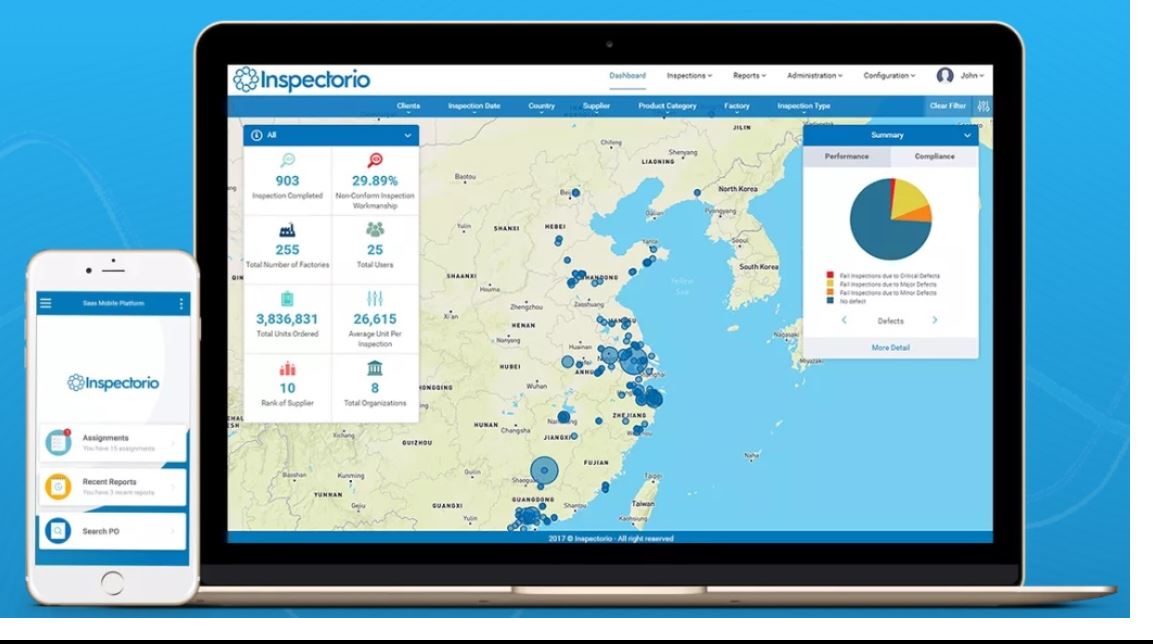 Inspectorio’s Quality Control and Compliance Monitoring Suite
Source: Inspectorio.com
Inspectorio’s Quality Control and Compliance Monitoring Suite
Source: Inspectorio.com
Market Overview/Addressable Market
Inspectorio’s clients are part of the apparel supply chain. According to Euromonitor International, the global apparel industry was worth $1.3 trillion in 2017 and is estimated to grow at a CAGR of 5% to 2022.
What Problem Is the Company Solving?
The apparel and footwear industry is still largely served by a fragmented supply chain, where manufacturers, suppliers and retailers often work in silos with little coordination. The industry’s supply chain largely lags those of other industries in terms of applying technology to improve processes.
This fragmentation makes quality control and compliance monitoring very difficult for brands and retailers. Ensuring the efficiency of these processes is crucial for companies seeking to guarantee quality standards while providing products at attractive prices, achieving speed to market and avoiding reputational damage caused by association with production facilities with poor working conditions or environmentally unfriendly practices.
Headquarters
Minneapolis, MN
Funding Stage
Series A ($13.7 million)
Business Model
Inspectorio earns revenues through a recurring subscription SaaS model. Fees vary based on the services provided.
Competitive Landscape
Inspectorio believes that no other company in the marketplace can compete with its robust feature set for quality control and compliance monitoring.
Management Team
Inspectorio’s founders and key management have decades of global experience in apparel and footwear sourcing and supply chain operations in diverse markets such as Vietnam, China, Ecuador and the US. The team includes CEO and Cofounder Carlos Moncayo Castillo; Managing Director and Cofounder David Klein; Managing Director, Chief Sales and Marketing Officer, and Cofounder Fernando Moncayo Castillo; CTO Jonathan Bardin; and COO and Cofounder Luis Moncayo Castillo.
Company Outlook
In the next few months, Inspectorio plans to expand its platform capabilities to include production tracking and responsible sourcing verification and to use the IoT to verify manufacturing locations.
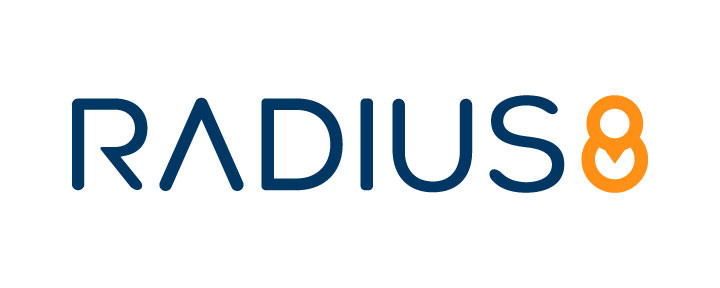
Radius8
Company Description
Radius8 has created a retail software platform that empowers retailers to dynamically merchandise online by using data on their physical stores and local market intelligence to provide contextual discovery for shoppers. The Radius8 localization cloud collects data on local browsing behaviors, weather, store inventories, events, geolocation, time of day, social trends and in-store sales trends. The platform identifies differences between store locations and shoppers’ proximity to stores, providing retailers with insights on local in-store and online buying trends. Companies can then use these insights to offer relevant and engaging experiences across physical and digital channels. For example, retailers and brands can dynamically merchandise based on what’s happening in-store and within the local market.
Radius8’s Pre-Shop and Smartbars tools enable retailers to provide dynamic, store-powered catalog pages on specific website pages, such as store search engine optimization (SEO) pages and store locator pages, to connect with shoppers during the pre-shopping experience. The tools allow consumers to view inventory available in local stores, reserve products for pickup and receive localized product recommendations.
Over the past 12 months, Radius8 has signed contracts with leading retailers and brands that operate globally. The company’s current clients include Academy Sports + Outdoors, Guess, John Varvatos, Lucky Brand, Orvis and Zumiez. Radius8 partners with various companies to optimize its solutions, including Narvar, Rio SEO, Salesforce, Tulip and Yext.
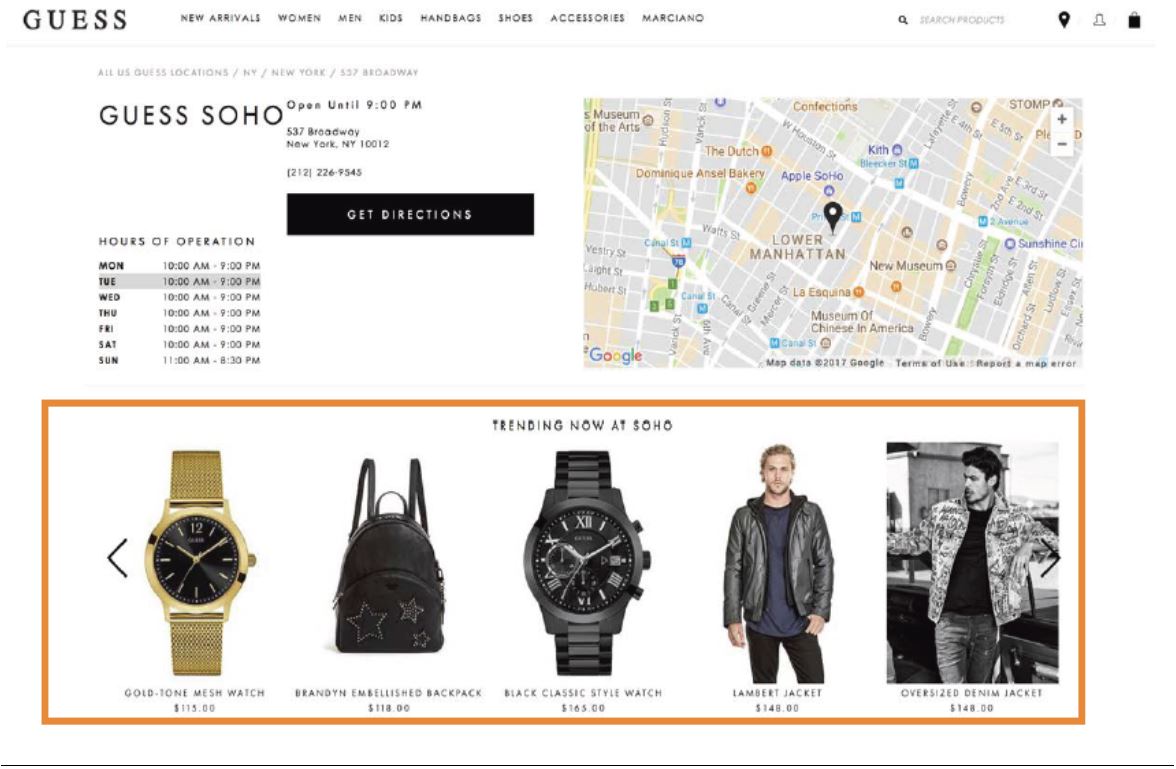 Radius8’s Smartbars on Guess SEO page
Source: Guess/Radius8
Radius8’s Smartbars on Guess SEO page
Source: Guess/Radius8
Market Overview/Addressable Market
According to Radius8, more than 4,500 retailers operate more than 1 million brick-and-mortar store locations combined in the US. This presents a $1.3 billion total addressable market for the company. Radius8 has focused its growth on the specialty apparel, footwear and sporting goods subverticals, which represent an immediate market opportunity of more than $200 million.
What Problem Is the Company Solving?
With more shoppers now beginning their shopping journeys online, digital channels are having a greater impact on purchase decisions. More than 50% of shopping journeys start online, the growing majority of them on mobile devices, and that figure will rise to 58% by 2022, according to Forrester Research. Traditional retailers must not only leverage the power of the online world, but also connect their physical and digital operations to provide shoppers with a seamless, tailored, multichannel experience that online pure plays cannot match.
Providing localized and actionable insights to store associates and managers, as well as to digital marketers, can help retailers generate new conversions in stores and drive online-to-offline retail experiences. These, in turn, help retailers mitigate the rising costs related to e-commerce fulfillment. Successful localization requires clustering similar stores on the basis of sales and customer data, including buying patterns, demographics, local weather, store size and other information.
Headquarters
Princeton, NJ
Funding Stage
Seed (not disclosed)
Management Team
CEO and Cofounder Sandeep Bhanote has more than 20 years of experience building and running Internet and e-commerce businesses, focusing on mobile and cross-channel retail technology. He previously founded Global Bay Mobile, which was acquired by Verifone in 2011. VP of Strategy and Cofounder Brendan Phelan focuses on marketing initiatives, data and analytics, and corporate strategy. Phelan holds a PhD in Chemistry and Materials Science from Princeton University.
Company Outlook
In the third quarter of 2018, Radius8 plans to announce a Salesforce Marketing Cloud integration and a partnership with Lucky Brand. In the fourth quarter, the company plans to announce a new product feature set that enables retailers to leverage localization data seamlessly across any of their core systems.

Inturn
Company Description
Inturn is a global off-price B2B exchange that is reinventing the way brands and retailers sell and buy excess inventory to improve profitability, decision making and cash flow for both sides. The platform replaces the time-consuming and error-prone liquidity process that the off-price industry has traditionally relied on. It reduces manual work processes, expands accessible and content-rich product information, and integrates analytics into the brand-retailer negotiation process.
Market Overview/Addressable Market
The off-price market is estimated to be worth $1.5 trillion globally. Apparel, footwear and accessories alone represent a $250 billion opportunity. Over the last 10 years, the off-price sector has grown two to three times faster than traditional retail, and it is projected to continue its impressive trajectory. J.P. Morgan estimates that the US off-price market will achieve 41% growth by 2021.
What Problem Is the Company Solving?
Excess inventory is every retailer’s greatest challenge. Managed poorly, it can cripple cash flow and create unnecessary losses. Managed correctly, it can generate additional profits. Selling and buying excess inventory has historically been a manual, time-consuming and error-prone process, largely due to a lack of centralized information and the need to track negotiations through emails and Excel spreadsheets. Only recently have brands and retailers begun to invest in their back-end systems, which have been largely untouched over the past 30 years.
Inturn enables brands to gain full visibility into and control over their inventory data, so they can streamline their off-price businesses and determine the best way to move their product. Retailers can also leverage the platform’s real-time data to accelerate their sales processes and purchase more relevant product at higher volumes.
Headquarters
New York, NY
Funding
Series B ($22.5 million). Investors include B Capital Group,
Novel TMT, Benvolio Group and Forerunner Ventures.
Business Model
Inturn charges brands a monthly SaaS fee in addition to taking a percentage of each transaction completed on the platform.
Competitive Landscape
The company says that it currently has no direct competitors.
Management Team
CEO and Cofounder Ronen Lazar is recognized as a thought leader in off-price retail and previously cofounded startups to innovate in the nonprofit, entertainment and web directory industries. Cofounder and CPO Charlie Ifrah previously cofounded several other technology solutions companies that have transformed the nonprofit and entertainment industries. COO Abe Marciano is recognized as a global operations leader in e-commerce, payments and mobile applications. He previously worked at CardConnect, Braintree (a division of PayPal) and eBay. David Solomon, CRO, previously led efforts across enterprise strategy, business development, operations and finance at eBay and GSI Commerce. Brian Rogers, CTO, previously led global engineering teams at IAC and Kikin.
Company Outlook
Inturn is currently focused on the apparel, footwear, accessories, home and beauty categories in the US and Europe. The company plans to expand into the consumer packaged goods category, grow its business in Europe and launch in the Asia-Pacific region.

Markable
Company Description
Markable is a software company that offers enterprise solutions for larger brands and retailers and SaaS solutions for small and medium-sized ones. The company utilizes AI software, primarily in the form of computer vision, to analyze and organize images and products. The software provides brands and retailers with tools to utilize visual search, generate visually similar product recommendations and lookbooks, style products (through “How to Wear It” or “Complete the Look” features) and implement Markable’s AI-based attribute auto-tagging technology.
Users have the ability to upload a photo that they have downloaded or stored on their camera and find a product featured in the photo for sale online. Markable can return accurate or visually similar results for products that have traditionally been difficult to look up, products seen in passing and products that are not labeled online (for example, a shirt in a photo that has been posted on a social media platform).
Embedded in a retailer’s or brand’s website, Markable’s auto-tagging system allows shoppers to look up specific words and phrases, such as “puffy sleeves,” that typically would not be listed as keywords for a product. Markable’s software can identify images found online, in either photos or dynamic videos, and also ensure that only products that are in stock are recommended to users. By analyzing images pixel by pixel and automatically tagging images with attributes, Markable gathers comprehensive data about fashion apparel and accessories. The information in the company’s database can be used to provide new AI-based fashion trend forecasts.
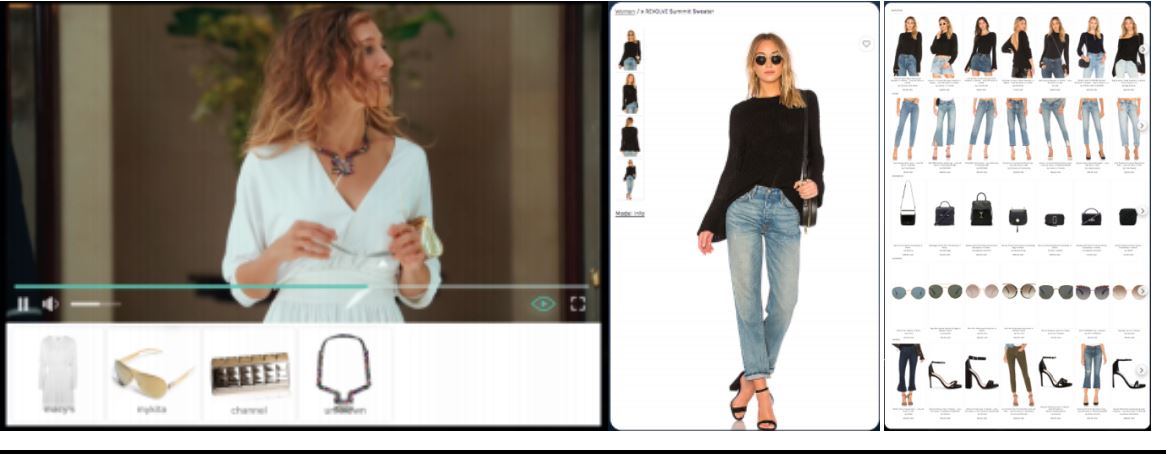 Markable’s video advertisement and Complete the Look capabilities
Source: Markable.ai
Markable’s video advertisement and Complete the Look capabilities
Source: Markable.ai
Market Overview/Addressable Market
Image search and AI are increasingly important aspects of the entire customer shopping process. Consumers are turning to Amazon and to search engines such as Google and Bing to look up products before purchasing them from a specific retailer or brand. In March 2018, Grand View Research estimated that the image recognition market will grow at a CAGR of 19.2% until 2025, when it will reach $77.69 billion.
What Problem Is the Company Solving?
Retailers and brands often use manually tagged, keyword-based search engines. However, these search engines are rarely helpful to shoppers who are searching for a product that they don’t know the name of, and they often return listings for items that are out of stock online.
Retailer and brand recommendations in ads and on recommended product pages often track broad-based consumer viewing and spending habits. Most companies do not target consumers based on images that the consumer is seeing in the moment, nor do they recommend visually similar products.
Headquarters
New York, NY
Funding Stage
$5 million in funding over five rounds. Investors include Cheetah Mobile and Plug and Play.
Business Model
Markable provides enterprise and SaaS solutions for retailers and brands. The company also provides clients with access to AI scientists and engineers who can help integrate Markable’s software into clients’ existing platforms.
Competitive Landscape
Technology companies such as Google and Microsoft are developing visual search products, but these are not tailored to retailers and brands. Many larger retailers are partnering with AI companies to incorporate some form of visual search. For example, Target has partnered with Pinterest and Macy’s with Slyce. However, Markable believes that its own software has unique, and more dynamic, capabilities, including multiple object tracking, auto-tagging attributes and true computer vision software.
Management Team
Markable benefits from a management team that has experience in data-intensive AI professions and online retailing. Its management team includes CEO and Founder Joy Tang, CTO Jonas Grimfelt, COO Balaji Ravindran and Deep Learning Scientist Dr. Rui Zheng.
Company Outlook
Markable is currently piloting its software with Forever 21, Revolve.com and Jollychic.com and recently launched its SDK with Eimy Istoire in Japan. The company is also looking to launch pilots with Weibo, WeChat, LiveMe.com and Xiaomi in China.

Price.com
Company Description
Price Technologies (Price), a San Francisco-based startup, aims to provide consumers with the most efficient product-matching service on the internet. The company’s vision is to maximize savings for consumers and, at the same time, benefit e-commerce businesses by providing them with a seamless checkout experience.
RJ Jain, founder of Price, says that the company is building the best price-matching technology in the world by applying the latest developments in machine learning (ML) and artificial intelligence (AI) to solve some of the most complex problems facing the price comparison industry, especially with regards to products classification.
Currently in beta, Price will license its product matching, visual search, and browser extension technology to the online retailers and marketplaces. The benefits available to companies that purchase this license will range from improved user experience to more relevant search results, through increase in traffic/users, improved consumer engagement and increased retention.
Price’s e-commerce application will bridge the present gaps between online marketplaces by providing complete price transparency for shoppers. The company’s product matching technology leverages data on more than 150 million products collected from more than 2,000 retail partners and online marketplaces.
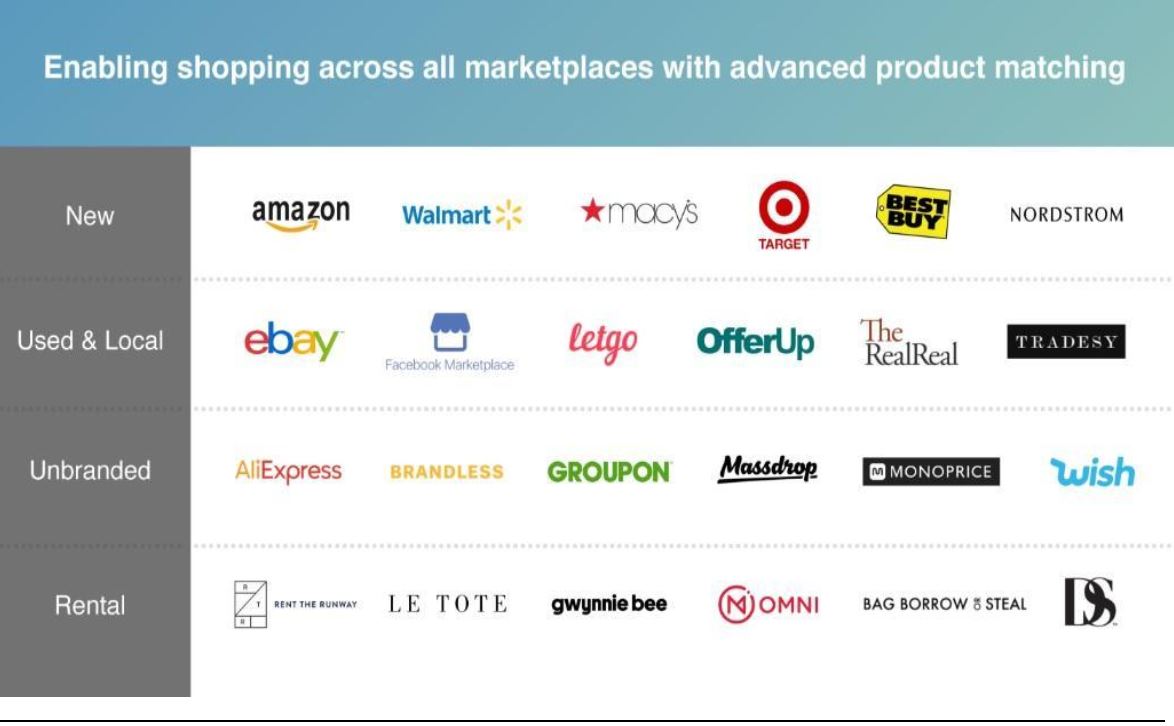 Price.com delivers search results from a comprehensive list of the top marketplaces
Source: Price Technologies
Price.com delivers search results from a comprehensive list of the top marketplaces
Source: Price Technologies
Market Overview/Addressable Market
Price’s potential users are from the e-commerce industry, which had net global value of $1.4 trillion in 2017 and will grow at a CAGR of 15% through 2022, according to Euromonitor.
What Problem Is the Company Solving?
Different e-commerce platforms and marketplaces structure their data and categorize their products differently. Price is focusing on matching products across these platforms and accurately comparing their features and attributes such as prices, which will help consumers select the best option according their needs, thereby maximizing their savings.
Headquarters
San Francisco, CA
Funding Stage
Seed ($3.5 million)
Business Model
Price will generate revenues by licensing its matching technology to online retailers and marketplaces, and also earn CPC/CPA commissions when consumers make purchases via price.com.
Competitive Landscape
Jain considers Google Shopping to be Price.com’s biggest competitor. However, he believes that no other price-aggregation service will be able match the product matching and identification capabilities offered by Price.
Management Team
A computer scientist and entrepreneur, Jain is Price’s founder, CEO and CTO. Prior to Price Technologies, Jain had founded a mobile test automation and optimization company, Appurify, which he subsequently sold to Google. He has also served as an advisor at venture capital firms and has held lead engineering roles at Zynga and Sidecar Technologies. The company’s core team comprises: (i) Sean Jones, head of Data Engineering; (ii) Saurabh Kumar, former head of data engineering at Walmart; (iii) Bhushan Jain, data engineer and former senior engineer at Overstock.com; (iv) Genevieve Graves, senior data scientist and former chief data scientist at hiQ labs); and (v) and data engineer lead Dan Miller.
Company Outlook
Price’s strategy is to expand its licensing business by continually enhancing its product-matching software. The company plans to soon add multiple language support to its application and roll out Price.com for consumers in 2019.

Spring Marketplace
Company Description
Spring Marketplace (Spring) operates at the intersection of retail, payments and digital marketing, helping companies gain insights into their customers’ purchase behavior and target their engagement strategies accordingly. Through partnerships with payment networks (Visa, Mastercard and American Express), Spring connects consumers’ payment cards to customized loyalty programs, enabling retailers to track how their digital marketing affects in-store transactions in real time and tailor their future efforts based on that information.
Spring’s cloud-based marketing platform functions as an extension of retailers’ existing customer relationship management solutions. The Spring platform provides two core feature sets: Customer Insights and Customer Engagement. The first provides clients a complete view of customers’ spending behavior in-store and online. The second turns these analytics into targeted marketing strategies in the form of real-time messaging and incentives. The data are connected to the Spring Reporting Dashboard to provide retailers with actionable marketing solutions.
The platform is designed to collect:
- Identified profile with contact information and permission.
- Real-time in-store and online transaction data.
- Geolocation information (through Wi-Fi and phone ID).
- Purchase activity outside the retailer’s own store across malls in the Spring Network.
To date, the Spring platform has processed transaction volumes totaling more than $300 million. Spring’s clients include large retailers and top US mall operators such as GGP, Macerich, PREIT, Simon Property Group, Starwood Retail Partners and Taubman Centers.
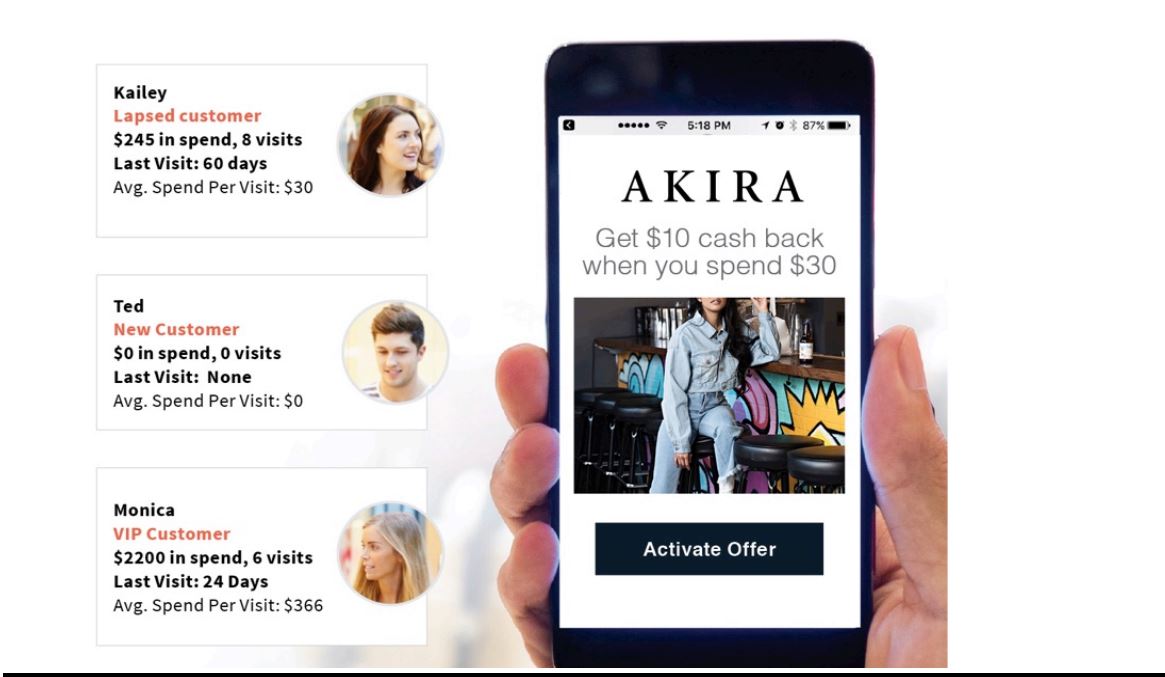 Spring’s payment-connected marketing offer
Source: SpringMarketplace.com
Spring’s payment-connected marketing offer
Source: SpringMarketplace.com
Spring’s platform also offers solutions for payment card issuers, which deliver value for merchants and consumers. For example, Spring utilizes merchant promotions to provide a new funding source to offset part of the $25 billion that card issuers pay out in rewards programs annually. Card issuer reward funding, in turn, provides a large subsidy to offset retailers’ marketing costs. Consumers benefit by gaining more value on their payment card of choice when they can use points to pay in a shopping mall. Spring has also developed an in-store “pay later” solution that provides consumers with additional purchasing power at specific merchants or across all stores in a mall.
Market Overview/Addressable Market
Omnichannel marketing is a priority for retailers and, given the rapid digitalization of marketing, it is increasingly important for businesses to connect with their target audiences promptly and convey the right message in real time. But traditional customer relationship management solutions are often inefficient and offer no connection to real-time purchase data from physical stores, where approximately 80% of retail sales still occur.
In 2017, digital ad spending in the US grew by 15.8% year over year, to $83 billion, and it accounted for 40.5% of total ad spending, according to market research firm eMarketer. The firm expects digital channels to account for more than 51% of total ad spending by 2021.
What Problem Is the Company Solving?
E-commerce has gifted retailers an abundance of data on consumers’ visiting, browsing and buying behaviors, but physical stores remain a data black hole: beyond traditional footfall measurements, retailers have typically had little access to robust, granular data on in-store visitors’ behavior.
In the wake of challenging traffic and store closure trends, many traditional retailers are now prioritizing omnichannel retailing and leveraging in-store analytics technologies to track, measure and analyze shoppers’ activities in stores and shopping centers. This information can be used to understand the shopping patterns and preferences of individual consumers. By bridging the online/offline gap, retailers can better target their marketing and brand-building efforts across multiple customer touchpoints.
Headquarters
Chicago, IL
Funding Stage
Series B
Business Model
Spring generates revenue through a recurring subscription SaaS model as well as through performance-based revenue conversion fees.
Competitive Landscape
Spring believes that its offering is unique, as it both collects customer insights and converts the data into suitable engagement tools to drive traffic to stores. Many other companies simply collect data. While some of its competitors, such as Plenti and Alliance Data Systems, provide loyalty programs, Spring believes that its flexibility to scale and the ease with which retailers can integrate its platform into their existing programs help it stand apart from the competition.
Management Team
CEO and Cofounder Bruce Mitchell has 20 years of experience running Internet and e-commerce businesses. He previously founded and led Apartments.com, which had an exit enterprise value of nearly $600 million. Mitchell also previously worked at Classified Ventures, Yesmail, BigMove.com and Groupon. COO and Cofounder Jonathan Dyke formerly held several roles at Corporate Executive Board (CEB), including Sales Leader, Executive Director of Technology and Product Development, and CIO. CEB was floated with a successful multibillion-dollar IPO. Dyke also cofounded and served as COO of Edo Interactive. His experience at CEB gave him insight into the masses of payment data that lie virtually unused after transactions and alerted him to their potential in terms of marketing. Dyke believed that it was challenging for private networks of retailers, brands and merchants to leverage payments infrastructure on their own and that there needed to be a coalition network to solve these problems. This eventually led to the establishment of Spring.
Company Outlook
Spring is expanding its platform across 75 additional malls in the coming months and to more than 400 malls across the next two years. The company’s “pay with points” and “pay later” solutions will be in market by the 2018 holiday season. The company is also working on several cross-border partnerships in order to provide a unified shopping app through which foreign visitors can earn rewards for purchases they make across the Spring mall network. The app will provide new revenue opportunities for Spring clients. The company plans to expand its partner roster to more than 250 mall locations and 45,000 store locations by the end of 2019.

Trivver
Company Description
Trivver provides an exchange platform for XR advertisements, including 3D, AR, VR and MR ads, enabling advertisers and brands to create a single 3D object to implement across all XR platforms.
Trivver claims that its platform benefits users, publishers, advertisers and brands. For users, Trivver eliminates intrusive pop-up and preroll video ads by integrating ads into XR environments. The company offers directed ads that provide insider deals, while maintaining a philosophy of presenting ads unobtrusively. Publishers (the developers of XR applications such as games and home tours) can use Trivver’s XR ad network to grow their revenue. Trivver aims to make monetizing games and apps easy for publishers, even if they do not have a high volume of users. For advertisers, Trivver’s XR ad exchange provides opportunities to utilize interactive branded content across a variety of XR platforms. The company’s cookie-less technology also allows advertisers and brands to measure user engagement with products, regardless of platform.
By unifying distribution for all XR platforms, Trivver seeks to simplify advertising within immersive environments, providing a more scalable, personalized and efficient interface. Advertisers looking to promote products and services inside XR environments need only deliver a single 3D object to Trivver. The company then deploys the “smart object” to targeted audiences and automatically resizes and fits it so that it appears natural in any given XR environment.
Trivver’s product can also be applied to 2D smartphone applications. The company’s Product Portal is an interactive display menu within an XR environment that provides an unobtrusive tool that enables consumers to learn more about products, brands, discounts and purchasing opportunities without having to leave the XR experience. The menu also gives users the ability to share the product from within the XR.
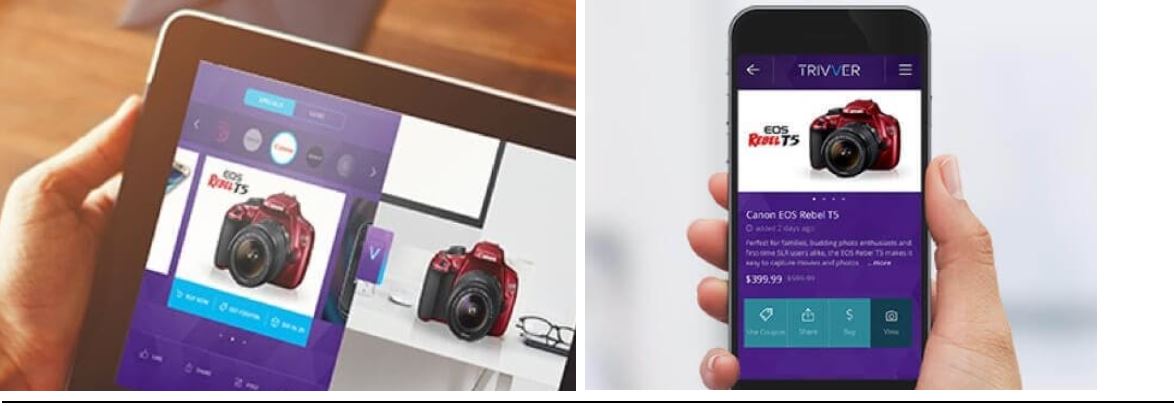 Trivver’s Smart Tab panel allows users to discover products
Source: Trivver.com
Trivver’s Smart Tab panel allows users to discover products
Source: Trivver.com
Market Overview/Addressable Market
The XR market, which includes 3D, AR, VR and MR digital environments, is expected to generate more than $200 billion in revenue in 2021, according to a recent Citi GPS Global Perspectives & Solutions report. The same study projects that XR content will generate more than $1.3 trillion in revenue by 2035.
What Problem Is the Company Solving?
Traditional forms of advertising, such as banners and preroll video, have become commoditized and tend to disrupt the user experience. Monetizing the XR environment would alleviate these issues, but advertising in XR is currently costly, painstaking and time consuming. Branded objects need to be manually inserted into different environments, and, since most audiences view content on multiple devices, tracking users is difficult.
Headquarters
Newport Beach, CA
Funding Stage
Currently raising a series B round
Business Model
Trivver serves as a matchmaker for XR content developers and brands that want to advertise within XR environments. It derives revenue by participating in fees that advertisers pay to content owners and for various actions, including product purchases and social media sharing. In addition, the company generates revenue by creating various XR environments and through licensing and royalties for use of its multipatented technology.
Competitive Landscape
More and more companies are entering the XR ad space, including Verizon subsidiary Oath, which launched its 3D and VR programmatic ads at Cannes in June this year. Adverty, Advr, Advrtas, IronSource, OmniVirt and Vertebrae all compete with Trivver to some degree. However, Trivver believes that no other company provides one platform that enables the automatic deployment, resizing and fitting of smart objects or offers tracking across multiple devices to the same degree that it does.
Management Team
Trivver benefits from a well-rounded leadership team with experience in the technology and digital media industries. The team includes CEO and Founder Joel LaMontagne, President Alan Haft and CDO Kevin Conroy.
Company Outlook
Trivver believes that it is well positioned to take advantage of the rapidly growing XR content market. It recently launched a robust, stress-tested ad platform that can support advertising within an array of XR environments. The company believes that its patents, market-ready technology and management team position it well for the next generation of XR advertisements.

True Fit
Company Description
True Fit is a data-driven personalization platform for footwear and apparel retailers. Its Genome platform collects manufacturing design data from leading apparel and footwear brands, anonymized consumer order data from top retailers, and personal preference data from its registered users.
Using AI technology, True Fit maps the style, fit and technical attributes from clothes and shoes to the detailed preferences of millions of individual shoppers. This allows retailers and brands to provide consumers with a personalized experience that includes personal style rankings, fit ratings, size recommendations and fit details.
True Fit has mapped the data of more than 11,400 brands globally, which have a combined shopper base of more than 400 million. Its platform is live on more than 200 enterprise retail sites and is used by more than 75 million registered users. After receiving $55 million in series C funding in January 2018, True Fit is now focused on enhancing its AI-driven data collection capability for apparel and footwear and bringing new offerings to market, including its Discovery Engine, True Insight, AI-driven outfitting and other solutions for fashion retail marketers.
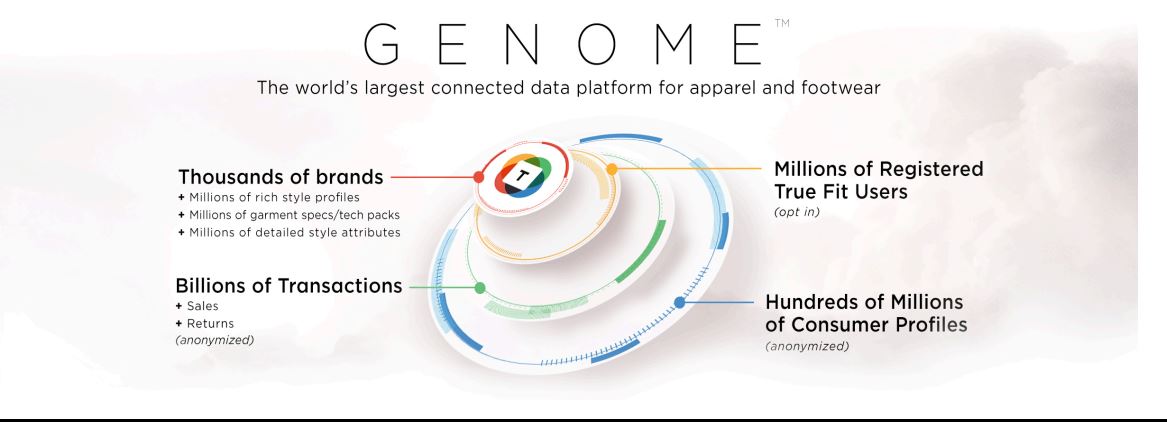 True Fit’s Genome platform
Source: TrueFit.com
True Fit’s Genome platform
Source: TrueFit.com
Market Overview/Addressable Market
The global apparel and footwear industry is the largest consumer vertical, worth $2 trillion in revenue annually.
What Problem Is the Company Solving?
True Fit seeks to transform digital fashion by making it personally relevant at scale. The company offers a data-driven matchmaker and intelligence platform for fashion, helping shoppers find clothes and shoes they’ll love and keep. True Fit mapped the fashion genome to decode each person’s unique style, fit and size for every piece of clothing and every shoe. Retailers, brands and other technology companies use True Fit’s software and APIs to personalize every touchpoint on the customer journey. The software helps companies better curate their catalogs, search ads, retargeting, emails, on-site browsing experiences and product recommendations, ensuring that shoppers are continuously presented with the items most relevant to them.
Headquarters
Boston, MA
Funding Stage
Series C ($55 million), bringing total funding to $95 million
Business Model
True Fit is based on a SaaS delivery model. The company charges a flat monthly rate for unlimited retailer use, including some variable DaaS offerings. True Fit has been rigorously A/B tested by the world’s leading retailers and independent third parties, and it routinely delivers 10 times or higher ROI and a 4%–8% net incremental revenue lift by increasing conversion rates and decreasing returns.
Competitive Landscape
The company’s competitors include fit platforms such as Fit Predictor and Fit Analytics, but these size tools compete with only one part of True Fit’s business.
Management Team
True Fit’s management team includes CEO William R. Adler, Cofounder and Chief Product & Marketing Officer Romney Evans, and Cofounder and Chief Customer Officer Jessica Murphy.
Company Outlook
True Fit is leveraging its unparalleled data assets to empower the entire retail ecosystem to better personalize the customer shopping journey. The company grew threefold in 2017 and is on track to hit aggressive growth numbers in 2018, with a projected 85 million True Fit users by year-end.

 Caraa
Caraa Caraa’s Studio Bag collection
Source: Caraasport.com
Caraa’s Studio Bag collection
Source: Caraasport.com Inspectorio’s Quality Control and Compliance Monitoring Suite
Source: Inspectorio.com
Inspectorio’s Quality Control and Compliance Monitoring Suite
Source: Inspectorio.com Radius8’s Smartbars on Guess SEO page
Source: Guess/Radius8
Radius8’s Smartbars on Guess SEO page
Source: Guess/Radius8 Markable’s video advertisement and Complete the Look capabilities
Source: Markable.ai
Markable’s video advertisement and Complete the Look capabilities
Source: Markable.ai
 Price.com delivers search results from a comprehensive list of the top marketplaces
Source: Price Technologies
Price.com delivers search results from a comprehensive list of the top marketplaces
Source: Price Technologies Spring’s payment-connected marketing offer
Source: SpringMarketplace.com
Spring’s payment-connected marketing offer
Source: SpringMarketplace.com Trivver’s Smart Tab panel allows users to discover products
Source: Trivver.com
Trivver’s Smart Tab panel allows users to discover products
Source: Trivver.com True Fit’s Genome platform
Source: TrueFit.com
True Fit’s Genome platform
Source: TrueFit.com